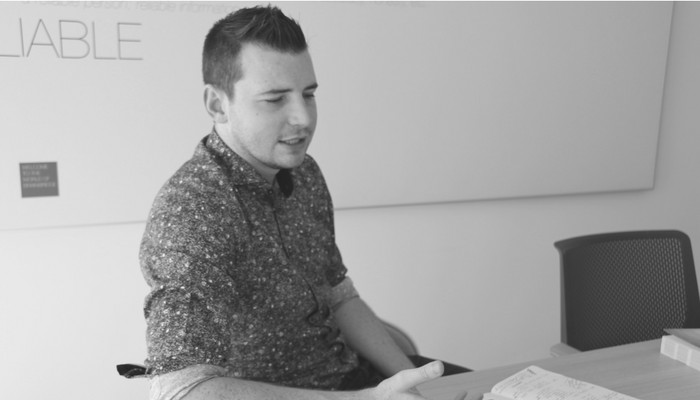Building the bridge between business and IT
on 27 December 2016 for ProfessionalsOne year ago, Lissa and Vincent started working for Exellys as IT business analysts for Umicore. Umicore is a worldwide and BEL20-listed company that aims to deliver materials (mostly metals) to the processing industry.
Are you reading this blog on your smartphone? Or on your laptop?Then odds are it contains materials from Umicore.
What it’s like being a business analyst on a day-to-day basis? And what skills do you need?
After one year of work, Lissa and Vincent know exactly the answers to these questions.
The role of a business analyst
At its core, business analysis involves identifying the needs of a business and creating solutions to potential problems.But, this doesn’t exactly answer the question of what is involved in the role of an IT business analyst. For Vincent, the role means translating the needs of the business in specific requirements for IT.
“A business analyst has to ‘create a bridge’ between the two different sections of a business where one is technology-driven and the other is business-driven.”After discussing the problems that are experienced and how their current systems are living up to expectations, they can gauge an idea of what is needed.
Lissa added that this is called the blueprinting phase and it involves “identifying gaps or missing functionalities in the IT system.”
After doing this, Lissa says that she works with developers to configure the missing functionalities in the IT system. Before going live with the changes, the system is tested to make sure it is up to standard.
With this in mind, we can say business analysts study the processes of a business and try to organize them more efficiently within IT.They try to close the gap between where the business is and where it wants to be. It’s what is called “business IT alignment”.”
Team projects and variation in job responsibilities
Both Lissa and Vincent work on projects.Lissa integrates the SAP system in several factories together with the whole IT team. Projects of this type can take around a year which means that she’s moving onto her second project since her start.Vincent also noted that next to projects, he provides support by solving problems on a daily basis. By organizing various workshops and trainings for internal teams, he ensures that the users know how to use the system properly.
Lissa: “To me, every project is different. You work with different people and you’re always facing different challenges.”Vincent echoes her view: “The variation in my job responsibilities is definitely important and enriching.”
Travel around the world
Ni Hao. Annyeonghaseyo.(‘Hello’ in Chinese and Korean)Lissa: “These are some of the few words I still remember.” “I’m working on projects around the world. I have been in Korea with the team for a SAP launch. And currently I’m working on a project in China.”
Vincent has been to Korea and Hong Kong and current projects include trips to the US, Italy and Belgium.He adds: “For me, the possibility to work internationally was an important reason to choose for a company like Umicore.”International experience gives you the opportunity to grow fast, both on a personal and a professional level.
Lissa: “It pushes you out of your comfort zone. This way you gain more self-confidence in making important decisions.”Vincent: “It’s always a nice experience to work in different countries that have different cultures. I’ve met a lot of nice colleagues face-to-face and this way I’m growing my international network.But the food in Korea…That was the worst for me. Very often I had no idea what I was eating, and frankly, I don’t want to know. When I got home, I was very happy to have some good Belgian fries again.”
Not a techie but a social activator
If this all sounds good to you so far, you probably want to know what skills you need to get a job as IT business analyst.So, let’s take look what our two experts said.
The main talents you will need are people skills, business expertise, technical insight and the ability to analyze and find solutions (analytical).Lissa and Vincent both graduated in Business Engineering in Management Information Systems from the University of Antwerp.
Vincent: “It is not required to have a very technical background. The experience in mapping business processes that we got during our studies was very useful, though.”“Moreover, when we started working at Umicore, we got the opportunity to participate in a 2-weeks starters’ course at SAP. In this training course we learned to work with the software modules (Material Management & Sales and Distribution) we would use on a daily basis”, Lissa adds.
When it comes to business expertise, Vincent says that this isn’t necessarily something you can have without experience which is why it takes months or even years to know a business inside out.Lissa: “The expertise and technical knowledge are things you can learn. That’s different for the analytical and social aspects of our job. Those are mainly skills you have.”As the title of the job suggests, analytical skills are vital, Vincent continues. “By talking to users you need to translate the business into a short list with bullet points.”
And as mentioned, people skills are also essential.Lissa: “You have to be able to listen actively in order to detect the needs. You also have to be able to get along well with others, because you work in a team every day.”“You have to be a strong communicator”, Vincent adds. “You often take the lead in work sessions, trainings, etc. You have to be able to bring your ideas and solutions across to the team in a clear way.”
Has reading this interview with Lissa and Vincent got you interested in business analysis? Are you passionate about technology and do you enjoy working with others? Let’s get in touch!
Many thanks to Lissa & Vincent. We wish both of them all the best in their future career as IT Business analyst.
Tags: career , exellyst





